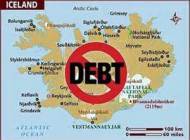 Sent to us by the author.
Sent to us by the author.
Despite the barrage of catastrophic financial data throughout the Western world, there may be a glimmer of hope coming from the tiny Nordic island of Iceland.
It must not be forgotten that it was Iceland which was one of the first to feel the fallout of the financial crisis of 2007-08. Unlike most of the other nations, however, Iceland showed tremendous backbone and did not allow, for the most part, any of the NWO monetary agencies to intervene in its affairs. So, any Icelandic currency reform considerations must be taken seriously.
Instead of following in the global insanity of massive money creation, artificial suppression of interest rates, and all other sorts of tricks and gimmicks, Iceland is considering the prohibition of banks from artificially increasing the money supply through the fraudulent and evil practice of fractional reserve banking (FRB).
The Financial Times reports that the government in Reykjavik is contemplating “a complete ban on its banks creating krona when they issue new loans. Growth in the money supply would become a matter of government policy alone.”* In the proposal under consideration, “the state has complete monopoly on legal tender. Banks can only lend what they have previously gathered in state money.” The Times adds: “Money created ‘out of thin air’ – the devilish secret at the heart of fractional reserve banking – become a relic of the past.” Oh, if it was only so!
Of course, the Financial Times gets much wrong in the story, but it does show that the monetary authorities of Iceland recognize that there is something radically wrong with the current monetary order, especially with FRB.
While Iceland’s proposal to eliminate banks from fractional reserve practices is commendable, the replacement of it by total governmental control would lead to similar, if not worse problems. Under such a system, the money supply would be subjected to the whims of politicians who, no doubt, would expand it at the drop of a hat to gain and or maintain their power among constituents. Such an arrangement should send chills down the spine of every native Icelander.
Economic theory has clearly demonstrated that a monopolist will exploit the privilege in which he or it is given and the Icelandic government would be like any other monopolist. Monopoly control leads to higher prices and shoddy services. In the case of a money monopoly, the quality of money (its purchasing power) would drop.
A far sounder proposal for Iceland and for the world at large is to take away the power of both banks and governments to create money “out of thin air.” This would mean a complete “de-politicalization” of the Icelandic monetary order. A non-statist monetary system would surely be based on commodities – gold and silver – where the money supply would be determined by the amount of minerals mined, not by government fiat.
A metallic monetary standard naturally puts a limit on the amount of money in “circulation” since it has to be “produced.” Extracting gold and silver from the earth is an expensive process. Printing paper notes is virtually costless.
What Iceland, and for that matter, the rest of the world apparently does not understand is that economic growth is determined not by the amount of money there is, but the amount of genuine savings. If Iceland seeks economic well being, it should undertake policies that increase savings.
There is a bigger hurdle that will most likely prevent either Iceland or any other nation from undertaking any meaningful monetary reform. FRB and central banking (which was created to legitimize fractional reserve banking) are the instruments where governments and the political elites derive much of their power. Central banks buy the public debt that allows government to spend recklessly without recourse. If this was taken away and states had to rely solely on taxation, their power would be severely curtailed.
Iceland and the Western world’s financial doldrums will only be cured when FRB and central banking are eliminated. Prior to this, however, public opinion must be convinced that the only economically sound and morally defensible monetary order is one where money is fully redeemable in gold and silver. Until this is recognized, Iceland and the rest of the global economies will continue to stagnate and eventually collapse.
* “Iceland’s Daring Raid on Fraction Reserve Banks.” Financial Times 10 April 2015.
http://antoniusaquinas.com/2015/05/31/monetary-reform-in-iceland-maybe-there-is-still-hope/
